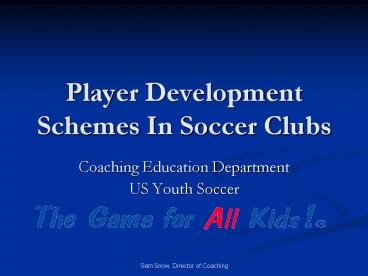Player Development Schemes In Soccer Clubs - PowerPoint PPT Presentation
1 / 23
Title:
Player Development Schemes In Soccer Clubs
Description:
Fitness (1:4) Strength. Plyometrics. Rhythmic Exercises. Tumbling. Technical (1:2) ... Soccer Festival free play, skills contests, speed gun, moon walk --- celebrate ... – PowerPoint PPT presentation
Number of Views:183
Avg rating:3.0/5.0
Title: Player Development Schemes In Soccer Clubs
1
Player Development Schemes In Soccer Clubs
- Coaching Education Department
- US Youth Soccer
2
PLAYER DEVELOPMENT
- American soccer clubs must have a scheme for the
development of all players, in all age groups and
all levels of play within the club. - The scheme must take into account the factors
that affect the development of soccer skill.
3
(No Transcript)
4
PLAYER DEVELOPMENT
- Quality of Teammates
- Quality of Opponents
- Quality of Coaches
5
SCHEME FOUNDATIONS
- Age Group
- Level of Competition
- Length of Season
- Frequency Training Matches
- Intensity Training Matches
- Duration Training Matches (Tournaments)
6
SCHEME FOUNDATIONS
- Scheduling
- From the US Youth Soccer National Championship
Series final backwards to opening day. - Training
- Preseason
- Midseason
- State/Regional/National Cup Competition
7
SCHEME FOUNDATIONS
- Training Session Focus
- Fitness (14)
- Strength
- Plyometrics
- Rhythmic Exercises
- Tumbling
- Technical (12)
- Training Session Focus
- Tactical (12)
- Regeneration
- Goalkeeping
- Team Building Activities
8
SCHEME FOUNDATIONS
- Olympic Development Program
- Scholastic Soccer
- Indoor Soccer
- Scheduled Time Off
9
Issues With Competitive Soccer
- The most talented players tend to play the most
matches (100) and are generally the least
rested. - By virtue of the number of matches played ( the
minutes played therein) the most talented players
tend to be under-trained (ideal 51 ratio 10,000
hour rule). Most of our elite players never
learn how to train in a professional manner.
10
SCHEME FOUNDATIONS
- Matches
- Friendlies
- Regulation Match
- League Match
- Tournament
- Who
- Where
- When
- Why
11
Recommended Training Session to Match Ratio
12
SCHEME FOUNDATIONS
- Parents Participation
- Social ? Support System (Family/Friends)
- Emotional/Psychological
- Ethical/Sportsmanship/Fair Play
- Process/Outcome
- Short/Long Term Perspectives
13
Eric Worthington, Teaching Soccer Skill
(Edinburgh Lepus Books, 1974), p. 49
14
(No Transcript)
15
SCHEME FOUNDATIONS
- Off-The-Field Habits Influences
- Nutrition/Hydration
- Sleep Habits
- Hygiene
- Balancing soccer with academics, social life,
family, work other sports.
16
SCHEME INFLUENCES
- Player development is impacted by the clubs
ability to provide facilities coaching. - Budget programming
- Affiliations Relationships
- History Tradition
17
SCHEME INFLUENCES
- The club in turn is impacted by the
existence/quality of the league/state/region. - Geography, Population, Per Capita Income
- Other Clubs Competition
- Rules Regulations
18
(No Transcript)
19
Extracurricular Programs
- TOPSoccer
- Soccer Start
20
Extracurricular Programs
- Speed Training
- ?
- Running Mechanics
- Mental Skills Training
- Fitness Testing
- ?
- Fitness Program
21
Extracurricular Events
- Social Activities to make the organization more
of a club and less of an association. - Dance (holidays)
- Picnic (crawfish boil, BBQ) for coaches for
parents for an age group - Soccer Festival free play, skills contests,
speed gun, moon walk --- celebrate the sport! - Match of the Week
22
Decision Making Formula
- Based First Foremost on the Player
- Based Second upon the Team
- Based Third on the Club
- Based Fourth on Logistics and the Family
23
Player Development Schemes In Soccer Clubs
- There are many people, particularly in sports
who think that success and excellence are the
same thing and they are not the same thing.
Excellence is something that is lasting and
dependable and largely within a persons control.
In contrast, success is perishable and is often
outside our control If you strive for
excellence, you will probably be successful
eventually people who put excellence in first
place have the patience to end up with success
An additional burden for the victim of the
success mentality is that he/she is threatened by
success of others and resents real excellence.
In contrast, the person fascinated by quality is
excited when he/she sees it in others. - Joe Paterno Penn State football coach 1990































